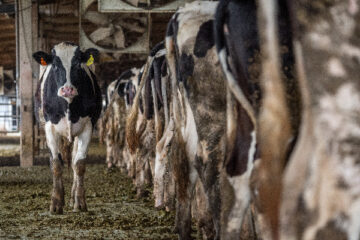The area devoted to organic cereals production in Ireland is relatively small, according to Department of Agriculture, Food and the Marine figures. However, there is a strong demand from other organic farmers and cereal processors for home-produced grain. Is it an option for you?
The natural immunity of plants is used to combat disease whenever possible. The organic tillage farmer aims to have a high level of organic matter and biological life in the soil. For full interpretation of the rules and regulations governing organic cereal farming, it is essential to study the ‘Organic Food and Farming Standards in Ireland’ document.
Rotation
Crop rotation is a planned sequence of different crop types. It is a key component of organic cereal production.
The role of the rotation is to:
- Provide the principal mechanism by which crops get nutrients.
- Manage the control of weeds, pests and disease levels.
- Help to maintain soil organic matter and enhance soil structure.
- Allow for the spreading of fertility requirements, and provide the capacity to build fertility.
There are no blueprints for rotations, as circumstances are different on every farm. The main factors are:
- Soil type
- Availability of nutrients for recycling
- Markets
- On-farm feed requirements
A successful rotation uses cropping sequences that:
- Match nutrient availability with requirements.
- Grow crops with different depths to efficiently utilise nutrient reserves.
- Disrupt weed, pest and disease life cycles.
Crop Nutrition
In order to maintain yields, nutrients need to be put back into the soil. Cereals have a high demand for nitrogen (N) and phosphate. Frequent soil tests should be used to monitor phosphate and potash levels. This is very important if crops are being sold off the farm.
Sources of nutrients that are permitted are:
- Farmyard manure and slurry produced on your own organic farm.
- Manures from other farms may be brought in and composted on the user’s holding – these manures must be from non-intensive production systems and must be declared GM free.
- The purchase of certain mineral fertiliser products containing phosphorus (P) and potassium (K) are permitted with prior approval from your organic certification body (OCB).
- Lime.
The main sources for N are:
- Clover, which has the ability to fix atmospheric N – can be sown as part of the rotation.
- Microbiological activity in well-managed soils can provide N from decaying organic matter.
- Farmyard manure can contain considerable quantities of N, but much of this can be lost during composting and depending on time of year spread.
Weed Control
No chemical weed control is permitted when growing organic cereals. Weed control is achieved mainly by preventative measures including:
- Rotation design
- Soil cultivations
- Variety selection
- Sowing dates
- Use of false seedbeds
The use of false seedbeds and manipulation of sowing dates are the two most efficient methods of keeping weeds under control. Mechanical weed control will provide a backup. To be successful, the weed seedlings must be small (not more than two leaves) – the smaller the seedling the better the control.
Pests and Diseases
Pests and diseases are generally not a major problem in organic grain crops. The main protection is through the selection of resistant varieties and the separation of crops by rotation. The relatively low incidences of pests and diseases on organic cereals is due in part to the hardier and more open type of growth obtained due to the lower amounts of N available.
Yields
Yields can vary both from farm to farm and year to year. In general, yields of organic cereal crops are lower than non-organic crops. Crop yields depend on a number of factors including: crop type; position in the rotation; land type; fertility levels; and, previous crops.
Organic Regulation for Seed Usage
Organic growers must make every effort to use organically certified seed. Conventional treated seed is not permitted to be used. There is an organic seed data base where growers can check organic details of suppliers and available organic seed. Growers must seek permission to use untreated non-organic seed from their OCB before sowing. It would be advisable to apply for and get this permission before ordering or purchasing seed.
Profitability
Organic cereals can be a profitable system of farming. Yields are lower than conventional cereals, however this is compensated by:
- Lower costs of production.
- The premium price per tonne of grain that can be achieved.
Rotational factors need to be taken into account, for example, organic land may return a tillage crop three years out of a five-year rotation.
Source: Teagasc



